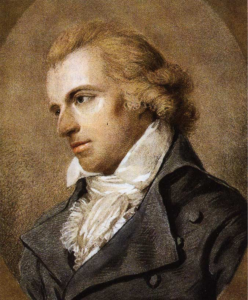Time's pace is threefold, Saying of Confucius
(Poet's title: Dreifach ist der Schritt der Zeit, Spruch des Konfuzius)
Set by Schubert:
D 43
trio for TTB
Schubert did not set the third stanza (in italics)[July 8, 1813]
D 69
canon for three voices
Schubert did not set the third stanza (in italics)[July 8, 1813]
D 70
trio for TTB
Schubert did not set the third stanza (in italics)[July 8, 1813]
Dreifach ist der Schritt der Zeit:
Zögernd kommt die Zukunft hergezogen,
Pfeilschnell ist das Jetzt entflogen,
Ewig still steht die Vergangenheit.
Keine Ungeduld beflügelt
Ihren Schritt, wenn sie verweilt.
Keine Furcht, kein Zweifel zügelt
Ihren Lauf, wenn sie enteilt.
Keine Reu, kein Zaubersegen
Kann die Stehende bewegen.
Möchtest du beglückt und weise
Endigen des Lebens Reise,
Nimm die Zögernde zum Rat,
Nicht zum Werkzeug deiner Tat.
Wähle nicht die Fliehende zum Freund,
Nicht die Bleibende zum Feind.
Time’s pace is threefold:
The future approaches with hesitation,
The present flies off as fast as an arrow and
The past remains silent forever.
No impatience gives wings
To its steps when time drags.
No fear, no doubt holds back
Its course when it speeds up.
No regret, no magic spell
Can move it when it has stopped.
If you want to be happy and wise when you
End the journey of your life
Take the hesitant as your counsellor,
Not as a tool for your actions.
Do not choose those that are flying past as a friend
Or those that remain as your foe.
All translations into English that appear on this website, unless otherwise stated, are by Malcolm Wren. You are free to use them on condition that you acknowledge Malcolm Wren as the translator and schubertsong.uk as the source. Unless otherwise stated, the comments and essays that appear after the texts and translations are by Malcolm Wren and are © Copyright.
☙
Themes and images in this text:
Fleeing Flying, soaring and gliding Not moving Walking and wandering
Physicists still refer to the arrow of time, but Schiller was more interested in the speed of the arrow than in its direction. Our inability to ‘seize the moment’ is also central to Faust, the great drama by Schiller’s friend Goethe. As Faust tries to experience life to the full he is always conscious of what is speeding past outside of his reach, meaning that there can be no contentment ‘in the moment’. As soon as he does declare that the perfect moment has arrived he has lost it. There is nothing left but regret. No magic spell can help. We yearn for stability, for stasis, for nirvana, for ‘the still point of the turning world’ (T.S. Eliot), but the opposite of flux is not calm but nothingness. Physicists now understand this too. It is thermodynamics. No movement = Absolute zero.
☙
Original Spelling and note on the text Spruch des Confucius Dreyfach ist der Schritt der Zeit, Zögernd kommt die Zukunft hergezogen, Pfeilschnell ist das Jetzt entflogen, Ewig still steht die Vergangenheit. Keine Ungeduld beflügelt Ihren Schritt, wenn sie verweilt. Keine Furcht, kein Zweifel zügelt Ihren Lauf, wenn sie enteilt. Keine Reu, kein Zaubersegen Kann die stehende bewegen. Möchtest du beglückt und weise Endigen des Lebens Reise, Nimm die Zögernde zum Rath, Nicht zum Werkzeug deiner That. Wähle nicht die Fliehende zum Freund, Nicht die Bleibende zum Feind. 1 In Schiller's original: Zweifeln (plural, doubts)
Confirmed by Peter Rastl with Gedichte von Friederich Schiller, Erster Theil, Leipzig, 1800, bey Siegfried Lebrecht Crusius, page 66.
To see an early edition of the text, go to page 55 [61 von 292] here: http://digital.onb.ac.at/OnbViewer/viewer.faces?doc=ABO_%2BZ207858202


